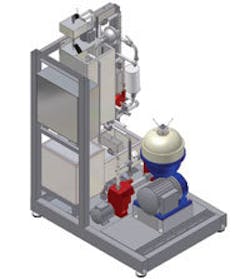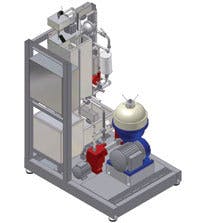Chemical-based technique achieves more efficient separation
Cost-effective separation based on a patented process could offer benefits in offshore applications, according to Viatech Systems’ CEO Olev Mäehans.
The technology has been developed by sister companies Viatech and SystemSeparation. Both companies have applied their expertise to different markets: Viatech’s focus is on the oil processing industry, and SystemSeparation’s on the power sector.
Their new system employs chemical additives to facilitate the separation process. These additives cut costs by reducing the scope of the mechanical equipment required. The technique also makes separation possible when mechanical systems alone are incapable of doing the job.
The basis of the technology emerged in the 1990s under the leadership of Mäehans and his partner Gunnar Ström, now technical director of SystemSeparation. For a period they worked in partnership with Alfa Laval, providing expertise on chemical software. But eventually Alfa Laval sold its chemical separation business, leading Mäehans and Ström to strike out on their own.
As an illustration of how the technology makes separation possible where other methods fail, Mäehans cites the example of lubrication oil in which oxidated products such as carbon have formed. The carbon fines are lighter than the oil itself, and are therefore not removed when the oil is put through a centrifuge separation system. The solution is a two-phase treatment: chemicals are introduced to induce a second liquid phase, in which the particles coalesce. The resulting droplets, which are non oil-soluble, can then be removed by a centrifuge.
During the early days of development, the partnership was asked to develop a solution for purifying oils used in a rolling mill operated by steel producer Sandvik. The answer was the UCO - ultra clean oil - module, which according to Ström functions in the same way as a kidney. As the oil circulates, a little passes through the module for cleaning at any time, so that every 24 hours all the oil is cleaned.
No lube oil changes
The result is that the oil remains completely clean - it never has to be changed out, merely topped up as required. Previously, when oil would pass through a cycle running from clean to dirty, production had to be planned according to how clean the oil needed to be for the product to be made: some products could only be produced when the oil was very clean. That kind of production constraint is now history.
The UCO has brought numerous other benefits. Productivity at the rolling plant has increased by 25%; product damage due to the condition of the oil has been cut by 80%, there are fewer enforced stoppages for repair; and oil discharge costs have been substantially reduced.
The UCO module supplied to Sandvik was a large piece of equipment, but the technology has been further developed and the module is now compact. As such, it is easy to move around and connect up to more than one machine.
Mäehans sees good potential for transferring the technology offshore, to tasks such as separating oil from produced water, demulsifying oil, for cleaning the lubricating oil of all kinds of rotating machinery, and for washing fuel. The system can achieve the separation efficiencies required offshore.
Fuel washing is needed when gas turbines are run on liquid fuels such as gas oil, diesel or crude. Additives are used to clean the fuel by, for example, removing any water and accompanying metal content which would otherwise foul the turbine vanes. SystemSeparation is now developing a proposal for such a system for an offshore customer.
Fuel oil additives are already supplied to the marine industry, another market for the technology. SystemSeparation has a cooperation agreement with Stena Line whereby it supplies additives for gas turbines on cruise liners.
The additives have developed into a business in their own right. Demand has grown fast, and Mäehans says SystemSeparation expects to become the market leader for additives supplied to the power industry this year. One interesting application is the use of additives to improve combustion and boost turbine efficiency.
On one occasion when it was possible to quantify the difference made by the products, they were found to be responsible for an extra 5% power generation, which over a year was worth $3 million, according to Mäehans.
The technology has also found application in separating out the various constituents of slop lakes - mixtures of oil, water and sediment which have proved difficult for other techniques to cope with. Once recovered, the value of the oil can be realized, providing payback for the investment often within a year. But a good understanding of the overall chemistry is required, as it is important while recovering the oil not to make it more difficult to recover the water, Mäehans points out. Systems for dealing with slop lakes have been supplied to a number of customers in Russia.•
For more information, contact Olev Mäehans, Viatech Systems. Tel +46 18 140081, fax +46 18 120072. [email protected], www.viatechsystems.se. Alternatively, Gunnar Ström, SystemSeparation Sweden (same phone and fax), [email protected], www.systemseparation.com.

